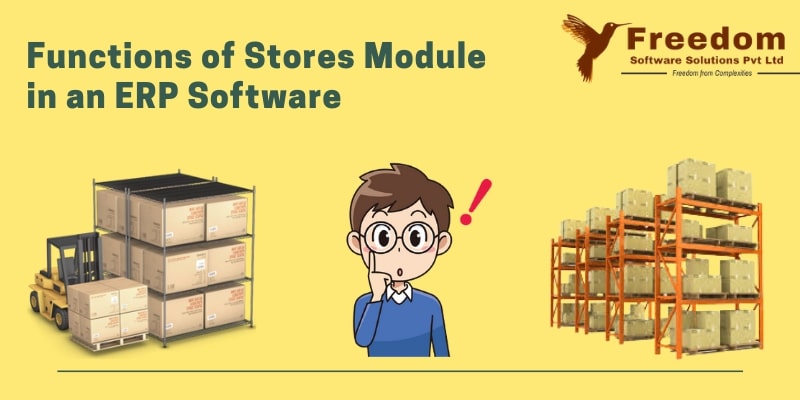ERP is a Software Package having several modules integrated creating a centralized database. Each module is necessary for an organization for smooth running. Coming to Manufacturing industries the two most important functions are production and inventory. The production is a team where the products are being manufactured and the whole responsibility of supplying the required raw materials and other stuff to the production department lies with Inventory Management. Now let’s see about the functionalities of the Stores module in ERP.

The Store department plays a crucial role when it comes to manufacturing. The main function of the stores is to supply the correct raw materials in the right quantity at the right time. Not only supplying but also managing all the materials in a well-organized manner to retrieve them quickly when in need. When dealing with a large number and variety of products, it is not an easy task to fetch a material among those huge numbers of racks. Hence in this case the software can tell you where exactly you can find the material. And another main concept of having a store module is to maintain a minimum stock level quantity.
Imagine a situation where your delivery time is nearing and you suddenly go out of stock with raw materials. You have no time in finding vendors and negotiating the price. Thus the software then and there alerts you to avoid facing such situations.
Here is the list of some functionalities that a Stores module in ERP has.
Material Inward: Concerning the requirements for production, material inward refers to the number of Raw materials bought from the vendors. This is done for three aspects such as purchase order, job order, and labor order
Inward Return: In some cases, there may be any defective materials received from vendors. These materials can be returned and those details can be fetched from this option.
Issue Request: This feature helps you to raise a request for the usage of some of the required materials from the store for the production process.
Stock Issue: At times you may be giving a few job orders to outside vendors, where the respective stock materials also should be provided to them. Hence you raise a request to issue the RM through from the stores.
Internal Issue: When you want to use some of the internal materials for the production process, you can raise the request and return the tools after their use.
Stock Summary: Stock summary gives you the complete details of the stock materials in the store, in terms of Batch wise, Stock Age-wise, Physical stock, and Division wise Stock.
Allotment: Allotment of materials in the stock takes place once a new sales order has been confirmed. Thus it makes sure, the required amount of raw materials is available for that particular production.
Division Transfer: Stock materials can be transferred within the divisions internally.
Stock Amendment: This gives the details of the number of materials that have been added or removed from the inventory date-wise.
Advantages of having Store Management :
- Since every single material is allocated in its place with a specified location, it is easy to retrieve it when needed.
- The stock management’s main purpose is to maintain a minimum stock quantity in the stores. This helps in avoiding last-minute hassles when the need comes.
- A manufacturing industry involves large and complex processes, where there are continuous movements of materials in the store. Having the store module keeps track of all the information up to date.
- Inventory management has a great impact on the smooth running of your business. As this module has control over all the materials it does not lead to any disputes and helps confidentially agree to any new order.
- An organization can save more with accurate control of its inventory.



